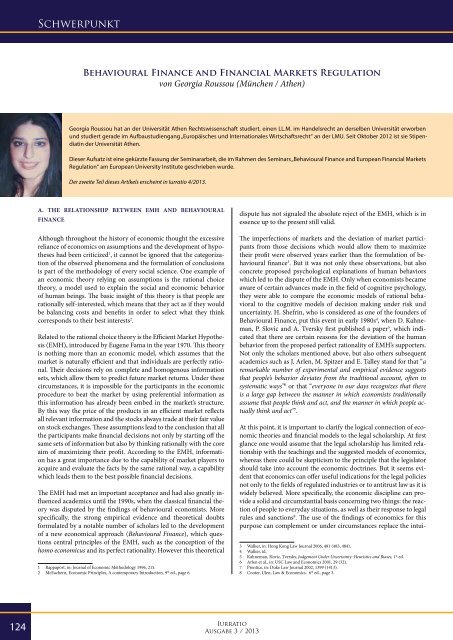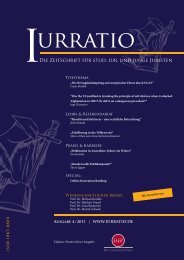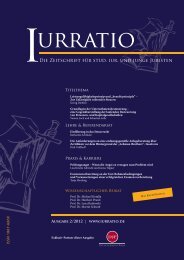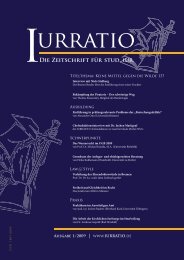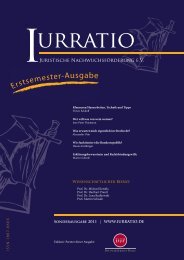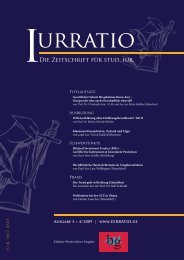Die Zeitschrift für stud. iur. und junge Juristen - Iurratio
Die Zeitschrift für stud. iur. und junge Juristen - Iurratio
Die Zeitschrift für stud. iur. und junge Juristen - Iurratio
Erfolgreiche ePaper selbst erstellen
Machen Sie aus Ihren PDF Publikationen ein blätterbares Flipbook mit unserer einzigartigen Google optimierten e-Paper Software.
Schwerpunkt<br />
Behavioural Finance and Financial Markets Regulation<br />
von Georgia Roussou (München / Athen)<br />
Georgia Roussou hat an der Universität Athen Rechtswissenschaft <strong>stud</strong>iert, einen LL.M. im Handelsrecht an derselben Universität erworben<br />
<strong>und</strong> <strong>stud</strong>iert gerade im Aufbau<strong>stud</strong>iengang „Europäisches <strong>und</strong> Internationales Wirtschaftsrecht“ an der LMU. Seit Oktober 2012 ist sie Stipendiatin<br />
der Universität Athen.<br />
<strong>Die</strong>ser Aufsatz ist eine gekürzte Fassung der Seminararbeit, die im Rahmen des Seminars „Behavioural Finance and European Financial Markets<br />
Regulation“ am European University Institute geschrieben wurde.<br />
Der zweite Teil dieses Artikels erscheint in <strong>Iurratio</strong> 4/2013.<br />
A. The relationship between EMH and Behavioural<br />
Finance<br />
Although throughout the history of economic thought the excessive<br />
reliance of economics on assumptions and the development of hypotheses<br />
had been criticized 1 , it cannot be ignored that the categorization<br />
of the observed phenomena and the formulation of conclusions<br />
is part of the methodology of every social science. One example of<br />
an economic theory relying on assumptions is the rational choice<br />
theory, a model used to explain the social and economic behavior<br />
of human beings. The basic insight of this theory is that people are<br />
rationally self-interested, which means that they act as if they would<br />
be balancing costs and benefits in order to select what they think<br />
corresponds to their best interests 2 .<br />
Related to the rational choice theory is the Efficient Market Hypothesis<br />
(EMH), introduced by Eugene Fama in the year 1970. This theory<br />
is nothing more than an economic model, which assumes that the<br />
market is naturally efficient and that individuals are perfectly rational.<br />
Their decisions rely on complete and homogenous information<br />
sets, which allow them to predict future market returns. Under these<br />
circumstances, it is impossible for the participants in the economic<br />
procedure to beat the market by using preferential information as<br />
this information has already been embed in the market’s structure.<br />
By this way the price of the products in an efficient market reflects<br />
all relevant information and the stocks always trade at their fair value<br />
on stock exchanges. These assumptions lead to the conclusion that all<br />
the participants make financial decisions not only by starting off the<br />
same sets of information but also by thinking rationally with the core<br />
aim of maximizing their profit. According to the EMH, information<br />
has a great importance due to the capability of market players to<br />
acquire and evaluate the facts by the same rational way, a capability<br />
which leads them to the best possible financial decisions.<br />
The EMH had met an important acceptance and had also greatly influenced<br />
academics until the 1990s, when the classical financial theory<br />
was disputed by the findings of behavioural economists. More<br />
specifically, the strong empirical evidence and theoretical doubts<br />
formulated by a notable number of scholars led to the development<br />
of a new economical approach (Behavioural Finance), which questions<br />
central principles of the EMH, such as the conception of the<br />
homo economicus and its perfect rationality. However this theoretical<br />
1 Rappaport, in: Journal of Economic Methodology 1996, 215.<br />
2 McEachern, Economic Principles, A contemporary Introduction, 9 th ed., page 6.<br />
dispute has not signaled the absolute reject of the EMH, which is in<br />
essence up to the present still valid.<br />
The imperfections of markets and the deviation of market participants<br />
from those decisions which would allow them to maximize<br />
their profit were observed years earlier than the formulation of behavioural<br />
finance 3 . But it was not only these observations, but also<br />
concrete proposed psychological explanations of human behaviors<br />
which led to the dispute of the EMH. Only when economists became<br />
aware of certain advances made in the field of cognitive psychology,<br />
they were able to compare the economic models of rational behavioral<br />
to the cognitive models of decision making <strong>und</strong>er risk <strong>und</strong><br />
uncertainty. H. Shefrin, who is considered as one of the fo<strong>und</strong>ers of<br />
Behavioural Finance, put this event in early 1980s 4 , when D. Kahneman,<br />
P. Slovic and A. Tversky first published a paper 5 , which indicated<br />
that there are certain reasons for the deviation of the human<br />
behavior from the proposed perfect rationality of EMH’s supporters.<br />
Not only the scholars mentioned above, but also others subsequent<br />
academics such as J. Arlen, M. Spitzer and E. Talley stand for that “a<br />
remarkable number of experimental and empirical evidence suggests<br />
that people’s behavior deviates from the traditional account, often in<br />
systematic ways” 6 or that “everyone in our days recognizes that there<br />
is a large gap between the manner in which economists traditionally<br />
assume that people think and act, and the manner in which people actually<br />
think and act” 7 .<br />
At this point, it is important to clarify the logical connection of economic<br />
theories and financial models to the legal scholarship. At first<br />
glance one would assume that the legal scholarship has limited relationship<br />
with the teachings and the suggested models of economics,<br />
whereas there could be skepticism to the principle that the legislator<br />
should take into account the economic doctrines. But it seems evident<br />
that economics can offer useful indications for the legal policies<br />
not only to the fields of regulated industries or to antitrust law as it is<br />
widely believed. More specifically, the economic discipline can provide<br />
a solid and circumstantial basis concerning two things: the reaction<br />
of people to everyday situations, as well as their response to legal<br />
rules and sanctions 8 . The use of the findings of economics for this<br />
purpose can complement or <strong>und</strong>er circumstances replace the intui-<br />
3 Walker, in: Hong Kong Law Journal 2006, 481 (483, 484).<br />
4 Walker, id.<br />
5 Kahneman, Slovic, Tversky, Judgement Under Uncertainty: Heuristics and Biases, 1 st ed.<br />
6 Arlen et al., in: USC Law and Economics 2001, 29 (32).<br />
7 Prentice, in: Duke Law Journal 2002, 1399 (1413).<br />
8 Cooter, Ulen, Law & Economics, 6 th ed., page 3.<br />
124<br />
<strong>Iurratio</strong><br />
Ausgabe 3 / 2013


